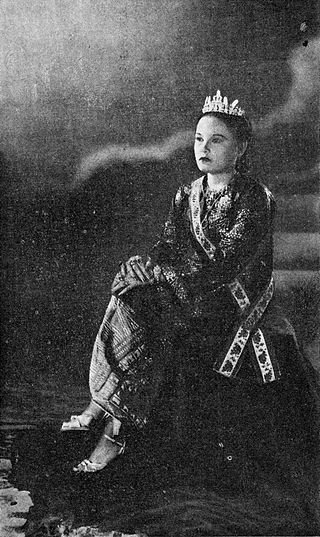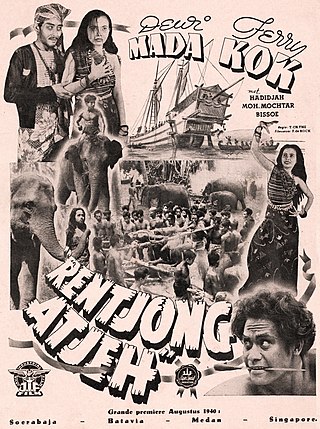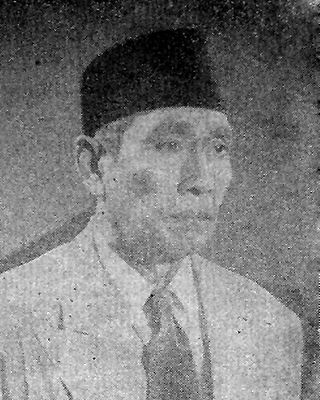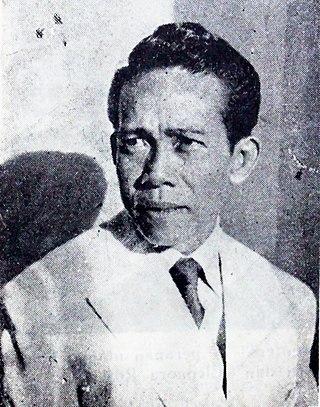
Ratna Moetoe Manikam (Perfected Spelling: Ratna Mutu Manikam), also known by the title Djoela Djoeli Bintang Tiga (Dance of the Three Stars; Perfected Spelling: Jula Juli Bintang Tiga), is a film from the Dutch East Indies (now Indonesia).

Ratna Moetoe Manikam (Perfected Spelling: Ratna Mutu Manikam), also known by the title Djoela Djoeli Bintang Tiga (Dance of the Three Stars; Perfected Spelling: Jula Juli Bintang Tiga), is a film from the Dutch East Indies (now Indonesia).
Sultan Darsjah Alam (Astaman) is the beloved leader of a prosperous eastern kingdom. The sultans of neighbouring kingdoms, jealous of this prosperity, connive and conspire to cause his downfall. However, Darsjah Alam remains focused on his own kingdom and is protected by a magical ring. However, prophecy foretells that, if the ring is lost, disaster will strike.
In the heavens live three goddesses, the sisters Laila Kesoema, Koemala Djoewita, and Ratna Moetoe Manikam (Ratna Asmara). Though Ratna and Laila get along well and want only to bring blessings to the earth, the brash Koemala has different intentions. Ratna and Koemala soon come into conflict over Darsjah Alam. Koemala attempts to woo Darsjah Alam, who – sensing that she does not love him – rejects her advances. In response, Koemala plots to send demons and jinns to destroy his kingdom. Laila overhears Koemala's scheming and tells Ratna, who in turn consults the elder god Batara Guru. He refuses to intervene, instead saying that Koemala's attack would be a test of Darsjah Alam's faith.
On Earth, Darsjah Alam is playing sepak raga in his courtyard when his ring is pulled off his finger by an unseen force. Shocked by this event, Darsjah Alam goes to the lakeside to meditate whilst the minister and palace staff chase after his ring. Upon arriving, Darsjah Alam sees a swan and hears a disembodied voice tell him to take it by the mouth. When he does so, the swan transforms into Ratna, who returns the sultan's ring and offers herself as his bride, should he accept her three conditions: he may not ask her name, origin, or lineage. Darsjah Alam agrees, and the two are married.
A year passes, and Darsjah Alam and Ratna have their first son, Bahroel Alam. As the kingdom prepares for an enormous celebration, Koemala – jealous of her sister's happy life – plans to disrupt the festivities. She transforms one of her servants into a human sultan named Indraboemi, who travels to the palace with his entourage. He spreads discord among the royal guests and palace staff; as the son of the sultan and an unknown woman, he says, Bahroel Alam lacks the heritage to be a proper sultan.
After the guests leave, Darsjah Alam goes to Ratna and asks who she is and where she came from. Ratna takes him to the lakeside, where she answers his questions then disappears. Darsjah Alam is soon taken to the land of the jinns, where Koemala takes him and casts him into a fire, turning him into a sheep. Indraboemi, meanwhile, is sent back to the palace to reign in Darsjah Alam's place. As his first act, he has a minister take Bahroel Alam away.
On his journey abroad, the minister meets Laila, who is passing as a human woman. They live in the forest for eighteen years, raising Bahroel Alam as if he were a poor boy. One day, while searching for fruit, Bahroel Alam discovers an overgrown palace, where he meets an old woman. She tells him that he is the son of the true sultan and sends him on his way, giving him an arrow in parting. Upon arriving home, Bahroel Alam throws the arrow at a passing sheep, having been overcome with a sudden urge. The sheep transforms into a dead Darsjah Alam. The old woman whom Bahroel Alam had met earlier comes and sprinkles flower petals over his body, bringing him back in life. The old woman then reveals herself as Ratna and says that the people are again in need of Darsjah Alam.
Laila, having returned to the heavens, rains down an army to help Bahroel Alam take control of the palace. Upon their arrival, Indraboemi flies into the sky to escape, higher than Bahroel Alam can fire his arrows. Ratna thus grants the young man the power of flight, allowing him to chase after Indraboemi and slay him. Meanwhile, in the heavens, Laila fights and defeats Koemala. Darsjah Alam is reinstated as sultan to much rejoicing. [1] [2]
Ratna Moetoe Manikam was directed by Sutan Usman Karim, under the pseudonym Suska. [1] He had worked as an editor for the Padang-based daily Persamaan, and had directed Panggilan Darah (1941) for Oriental Film before joining The Teng Chun's New Java Industrial Film (JIF). The's company produced the film Ratna Moetoe Manikam. Inspired by the success of The Thief of Bagdad (1940), Suska realised that a modernised version of a classic story could be successful. [3] He therefore adapted the plot for Ratna Moetoe Manikam from a stage drama entitled Djoela Djoeli Bintang Tiga, a staple of stamboel stage performances. [3]
The film starred Ratna Asmara, Astaman, Ali Joego, and Inoe Perbatasari. [1] Ratna Asmara and Astaman shot their roles film concurrently with Andjar Asmara's Noesa Penida . [4] Hajopan Bajo Angin handled artistic direction. [5]
According to director Tan Tjoei Hock, filming was interrupted by the Japanese occupation in early 1942; [1] the Japanese forces closed all local production houses, including New JIF. [6] Tan reportedly finished filming the work by order of the Japanese overlords. [7] The Indonesian film historian Misbach Yusa Biran writes that it was released during the occupation, which lasted until 1945, but he does not specify a year. [7]
The film is likely lost. The American visual anthropologist Karl G. Heider writes that all Indonesian films from before 1950 are lost. [8] However, JB Kristanto's Katalog Film Indonesia (Indonesian Film Catalogue) records several as having survived at Sinematek Indonesia's archives, and Biran writes that several Japanese propaganda films have survived at the Netherlands Government Information Service. [9]

Abisin Abbas, better known by his pseudonym Andjar Asmara, was a dramatist and filmmaker active in the cinema of the Dutch East Indies. Born in Alahan Panjang, West Sumatra, he first worked as a reporter in Batavia. He became a writer for the Padangsche Opera in Padang, where he developed a new, dialogue-centric style, which later spread throughout the region. After returning to Batavia in 1929, he spent over a year as a theatre and film critic. In 1930 he joined the Dardanella touring troupe as a writer. He went to India in an unsuccessful bid to film his stage play Dr Samsi.

Kartinah is a now-lost 1940 romance film from the Dutch East Indies that was written and directed by Andjar Asmara. The film, Andjar's directorial debut, follows a nurse and her superior as they fall in love in the Air Raid Preparation team. Produced by The Teng Chun's New Java Industrial Film, Kartinah was heavily subsidised by the country's government and through product placement. Although it was a critical failure, the new actors signed with the studio for Kartinah gave New Java Industrial Film increased production capabilities.

Ratna Asmara was an Indonesian actress and director. Originally active in theatre, in 1940 she starred in the romance film Kartinah, which her first husband Andjar directed.

Rentjong Atjeh is a 1940 action film from the Dutch East Indies directed by The Teng Chun. Telling of a group who take revenge against pirates in the Strait of Malacca, it starred Ferry Kock, Dewi Mada, Bissoe, Mohammad Mochtar, and Hadidjah. It was filmed near the shore in Batavia and reused footage from The's earlier work Alang-Alang (1939). Rentjong Atjeh, inspired in part by the Tarzan films, was a commercial success, although it may now be lost.

Raden Inoe Perbatasari was an Indonesian politician turned film director and actor.

Gadis Desa is a 1949 comedy from what is now Indonesia written and directed by Andjar Asmara. Starring Basuki Djaelani, Ratna Ruthinah, Ali Joego, and Djauhari Effendi, it follows the romantic hijinks of a village girl who is taken to be a rich man's second wife. The film, produced by a Dutch-run company, is recognised as the first in which future "father of Indonesian film" Usmar Ismail was involved.

Astaman was an Indonesian actor active from the 1910s until the mid-1970s. He was a leading actor in the influential theatre company Dardanella and, after entering the film industry with 1940s Kartinah, acted in 43 films.

Panggilan Darah is a 1941 film from the Dutch East Indies written and directed by Sutan Usman Karim and produced by Tjho Seng Han for Oriental Film. The black-and-white film starred Dhalia and Soerip as orphaned sisters trying to make a living in the colonial capital of Batavia before moving to Kudus to work at a clove cigarette factory.

Srigala Item is a 1941 film from the Dutch East Indies that was directed by Tan Tjoei Hock and produced by The Teng Chun for Action Film. Starring Hadidjah, Mohamad Mochtar, and Tan Tjeng Bok, the film's plot – inspired by Zorro – follows a young man who became a masked vigilante to take revenge against his conniving uncle. Srigala Item was a commercial success, which Misbach Yusa Biran credits to the plot's use for escapism. A copy of the black-and-white film, which featured kroncong music, is stored at Sinematek Indonesia.
Noesa Penida is a 1941 film from the Dutch East Indies which was directed by Andjar Asmara and produced by The Teng Chun of Java Industrial FIlm. It tells of a love triangle between two brothers, born to a commoner, and a noble woman.
Elang Darat is a 1941 film from the Dutch East Indies which was directed by Inoe Perbatasari and produced by The Teng Chun for Jacatra Film. A detective film, it follows a man who comes to a village to track the villainous bandit known only as "Elang Darat".
Djaoeh Dimata is a 1948 film from what is now Indonesia written and directed by Andjar Asmara for the South Pacific Film Corporation (SPFC). Starring Ratna Asmara and Ali Joego, it follows a woman who moves to Jakarta to find work after her husband is blinded in an accident. SPFC's first production, Djaoeh Dimata took two to three months to film and cost almost 130,000 gulden.

Asmara Moerni is a 1941 romance film from the Dutch East Indies directed by Rd Ariffien and produced by Ang Hock Liem for Union Films. Written by Saeroen, the film followed a doctor who falls in love with his maid, as well as her failed romance with a fellow villager. Starring Adnan Kapau Gani, Djoewariah, and S. Joesoef, the black-and-white film was cast and advertised to cater to the growing native intelligentsia. Despite mixed reviews, it was a commercial success. As with most films of the Indies, Asmara Moerni may be lost.

Ng. Ratu Djoewariah was an Indonesian actress and singer who was active in the 1940s and 1950s.

Air Mata Mengalir di Tjitarum is a 1948 film from what is now Indonesia, written and directed by Roestam Sutan Palindih for the Tan & Wong Bros Film Company.

Ali Joego was a stage and film actor and director active in the Dutch East Indies and Indonesia. During his twenty-year career he appeared in thirty films and directed seven.

Oriental Film was a film production company in Batavia, Dutch East Indies. Established by ethnic Chinese businessman Tjo Seng Han in 1940, it completed four black-and-white films before it was closed in 1941. All the company's films were screened into the 1950s but may now be lost. They were directed by two men, Njoo Cheong Seng and Sutan Usman Karim, and launched the careers of actors such as Dhalia and Soerip.

Rempo Urip was an Indonesian film director. He began his career in the theatre, serving as an extra and footballer for the Dardanella theatre company beginning in 1934. After six years and three troupes, Urip entered the film industry, working as a distributor for Oriental Film and assistant director for Java Industrial Film. He returned to the theatre during the Japanese occupation (1942–1945) and national revolution (1945–1949). In 1951 he joined Djamaluddin Malik's Persari as a director, completing thirteen films for the company before it closed in 1958. He continued as a freelance director until 1977.

Saputangan is a 1949 romance film from what is now Indonesia. Directed by Fred Young and starring Chatir Harro, Noorsini, and Astaman, it follows a young doctor who, after his fiancée is blinded in an automobile accident, becomes an optometrist and restores her sight.